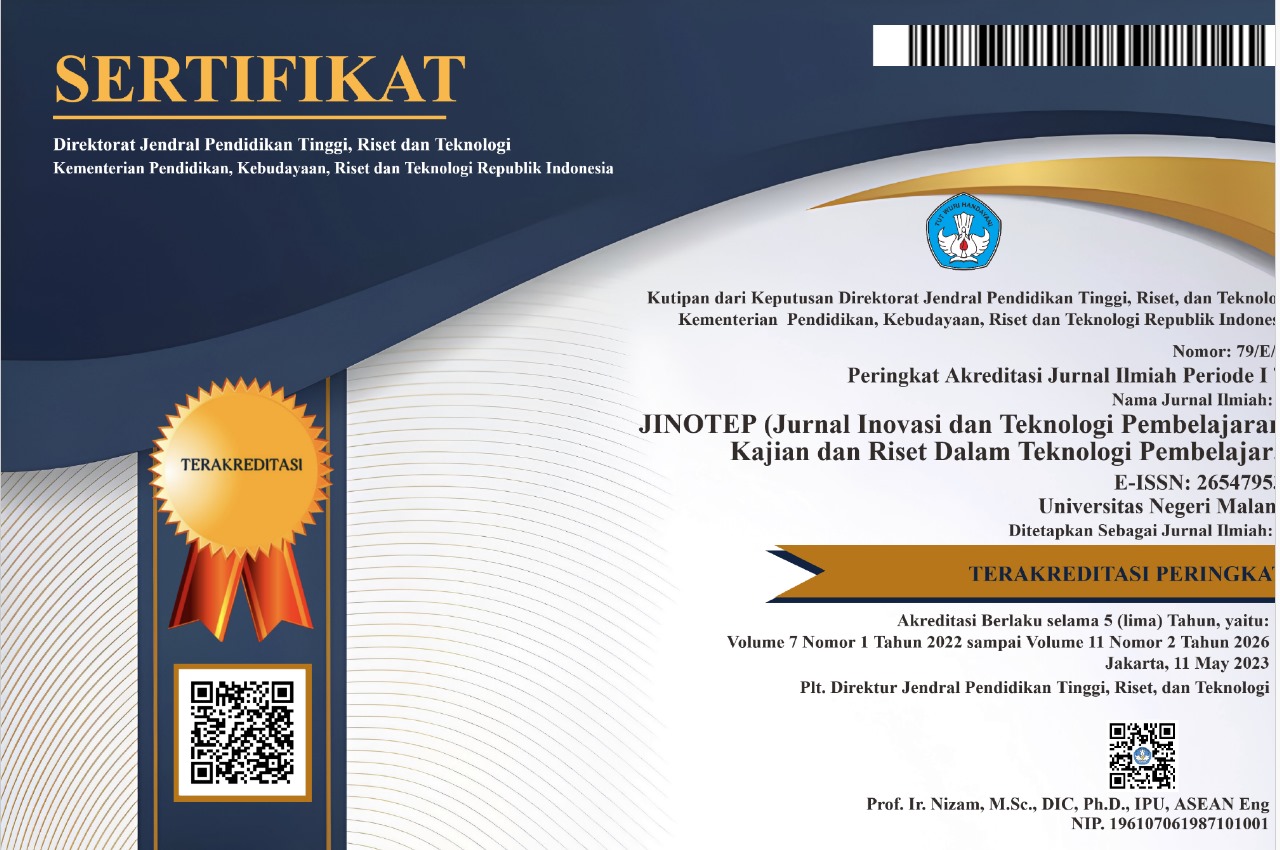Pengaruh Strategi Pembelajaran (Pembelajaran Berbasis Proyek VS Pembelajaran Langsung) dan Motivasi Belajar
Abstract
Abstract: This study was to investigate the effects of two strategies of instructions namely: project-based learning and direct instruction on concept understanding and motor skills achievement. The Main Purpose of the study examined: (1) the difference on understanding concept achievement among students taught with project-based learning and direct instruction; (2) the difference on understanding concept achievement among students with high and low learning motivation; (3) the interaction between project-based learning and learning achievement on concept understanding achievement; (4) the difference on motor skills achievement among students taught with project-based learning and direct instruction; (5) the difference on motor skills achievement among students with high and low learning motivation; (6) the interaction between project-based learning and learning motivation on motor skills achievement. The findings of the study were us follows: (1) there was significant difference in understanding concept achievement among students taught with project-based learning and direct instruction; (2) there was significant difference in understanding concept achievement among students with high and low learning motivation; (3) there was no interaction between project-based learning and learning achievement on concept understanding achievement; (4) there was significant difference in motor skills achievement among students taught with project-based learning and direct instruction; (5) there was significant difference in motor skills achievement among students with high and low learning motivation; (6) there is no interaction between project-based learning and learning motivation on motor skills achievement.
Keywords
Full Text:
PDFReferences
Asan, A., Haliloglu, Z. 2005. Implementing Project Based Learning In Computer Classroom. Journal of Educational Technology – TOJET. (The (Turkish Online), 4 (1): 68-81, (http://www.tojet.net ), diakses 4 Februari 2012.
Chartier, B. J., Gibson, Brad A. 2007. Project-Based Learning: A Search and Rescue UAV-Perceptions of an Undergraduate Engineering Design Team: A Preliminary Study. Journal of Proceedings of the 2007 AaeE Conference, Melbourne, (online), 1 (1): 1-6, http://www.cs.mu.oz.au/aaee2007/papers/paper_99), diakses 15 Februari 2012.
Donnelly, R. and Fitzmaurice, M. 2005. Collaborative Project-Based Learning and Problem-based Learning in Higher Education: A Consideration of Tutor and Student Roles in Learner-Focus Strategies. Journal of Emerging Issues in the Practice of University Learning and Teaching. (online), 7(1): 1-16, (http://www.Aishe.org), diakses 11 Mei 2012.
Elliot, S.H;, Kratchohwill, T.R., Littlefield, J.F. & Travers, J.F. 2000. Educational Psychology: Effective Teaching Effective Learning (3nd ed). Singapore: Mc. Grow-Hill Book Co. Foss, Patrick., Carney, Nathaniel., Donald,
Kurtis Mc., and Rooks, Matthew. 2007. Project-Based Learning Activities for Short-Term Intensive English Programs. Journal of Asian EFL. (online), 23 (1): 1-19, (http://www.asian-efl-journal.com), diakses 9 Februari 2012.
Fragoulis, Iosif. 2009. Project-Based Learning in the Teaching of English as A Foreign Language in Greek Primary Schools: From Theory to Practice. Journal of English Language Teaching.(online), 2 (3): 113-119, (http://www.ccsenet.org), diakses 24 Februari 2012.
Liu W.C., Divaharan, S., Peer, J., Quek, C.L., Wong, F.L.A. & Williams, M.D. 2004. Project-Based Learning and Student’s Motivation: The Singapore Context. Journal Australian Association for Research in Education. (online), 3 (1): 1-6, (http://www.aare.edu.au), diakses 24 Februari 2012.
Mioduser, D., Betzer, N. 2008. The Contribution Of Project-BasedLearning To High-Achievers’ Acquisition Of Technological Knowledge And Skills. Int J Technol Des Educ, (online), 18 (5): 59-77, (http://muse.tau.ac.il), diakses 2 Maret 2012.
Moursund, D. 2006. Problem Based Learning and Project Based Learning. (Online),1(1) (http://darkwing.uoregon.edu/- moursund.Math/pbl.html), diakses 7 Maret 2012.
Petrosino, A. 2009. Project-Based Learning: Background Knowledge and Theory. Madison: Wisconsin Center for Education Research. (online).http://college.cengage.com/education/pbl/background.html.), diakses 15 September 2011.
Ramos, H.P., De La Paz, S. 2009. Learning History in Middle School by Designing Multimedia in a ProjectBased Learning Experience. Journal of Research on Technology in Education (JRTE). (online), .42 (2):151–173, (http://www.iste.org.), diakses 21 Januari 2012.
SETDA, 2012. National Education: Trend 2012.http://www.setda.org/web/gue st/nationaltrend2012.) (online). Diakses tanggal 18 Februari 2013.
Schunk, Dale, H., Pintrich, Paul, R., Meece, Judith, L. 2008. Motivation in Education: Theory, Resarch, and Application. Pearson Education Inc. Upper Saddle River, New Jersey.
Wang, Y. dan Song, H. 2005. ProjectBased Learning (PBL) for Enhancing Chinese College Students English Performance. Journal Sino-US English Teaching, (Online), 2 (5); 59-64, (http://www.ieeexplorer.ieee.org.) diakses 12 Februari 2012
DOI: http://dx.doi.org/10.17977/um031v3i12016p001
Refbacks
- There are currently no refbacks.
Copyright (c) 2016 Abdul Hakim, Punaji Setyosari, Nyoman Sudana Degeng, Dedi Kuswandi

This work is licensed under a Creative Commons Attribution-ShareAlike 4.0 International License.
======================================================================
Jurnal Inovasi dan Teknologi Pembelajaran published by Universitas Negeri Malang in collaboration with the Asosiasi Program Studi Teknologi Pendidikan Indonesia (APS TPI) and Ikatan Profesi Teknologi Pendidikan Indonesia (IPTPI) with a MoU.
Publisher Address:
Educational Technology Laboratorium, Building D5, 1st Floor
Faculty of Education, Universitas Negeri Malang
Semarang St. No. 5, Malang City, East Java Province, Postal Code 65145
Email: jinotep.fip@um.ac.id
======================================================================

JINOTEP is licensed under a Creative Commons Attribution-ShareAlike 4.0 International License.
JINOTEP Statistics (Since July 13th, 2020)


.png)




.png)
1.png)
1.png)
4.png)
2.png)
1.png)
1.png)
.png)


_3.png)





1.png)
.png)